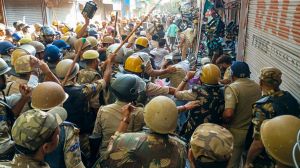Japanese encephalitis looming over Kochi
KOCHI, January 23: Japanese encephalitis which has a mortality rate of over 40 per cent, is looming over Kochi yet again, with the fading of...

KOCHI, January 23: Japanese encephalitis which has a mortality rate of over 40 per cent, is looming over Kochi yet again, with the fading of the monsoon and the salubrious mosquito-breeding season with the hotting up of the weather, the stagnation of drains and canals and the generally lackadaisical approach of the city corporation towards "clean city" or mosquito eradication.
Spread by the culicine mosquitoes, notably C Tritaeniorhynchus, C Vishnui and C Gelidus which breed in paddy fields, shallow ditches and pools, the disease infect mainly animals and, incidentally, humans.
An estimated 43,000 cases of Japanese encephalitis occur globally each year with 11,000 deaths and nearly 9,000 cases of disability.
Around 85 per cent occur in children below 15, while 10 per cent of the old is also affected. Serological surveys by the National Institute of Virology, Pune, indicate that there has been an upsurge in southern states such as Andhra Pradesh, Karnataka and Maharashtra and, of late, Kerala.
In 1995,reported deaths from Alappuzha alone was over 20.
Now serum from 62 suspected victims of Japanese encephalitis has been sent for virological examination and the result is still awaited. Japanese encephalitis is a migratory disease, transmitted from mosquitoes to birds to mosquitoes. Avian and water-birds are the common casualties, besides pigs which have very thin skin.
Infected pigs do not manifest overt symptoms, but can transmit the virus to humans. And, infection is seldom transmitted from man to man.
The incubation period in man is five to 15 days, with the ratio of overt disease varying from 1:300 to 1:1000. Japanese encephalitis cases are thus mere tips of the iceberg.
Onset of the disease is accompanied by fever, headache and malaise, with convulsions progressing even into coma. Fatality rate varies, but can reach even 58 per cent. Death occurs within nine days after the onset of the disease, according to doctors.
Currently vaccination of the population at risk is recommended. A "killed mouse-brain" vaccine is available. For primary immunisation, two doses of 1 ml each for adults and 0.5 ml for children under the age of three are recommended to be administered subcutaneously at an interval of seven to 14 days.
A booster injection of 1 ml should be given before the elapse of one year. Protective immunity develops within a month after the second dose, according to Dr Jils George of the District Hospital here. Vector control is the answer and was the answer, but the suspected cases of the disease in a hospital in Kochi and many hospitals in Kottayam have not served to activate the City Corporation which limits its programmes to fogging, which is ineffective on Japanese Encephalitis vector.
Fogging should be on the surface, not in the air, if JE mosquitoes and its larvae have to be exterminated and the focus should be on larvae destruction. The Corporation, in coordination with the health authorities, are planning to launch an anti-mosquito campaign, according to DMO Karunakaran.






- 01
- 02
- 03
- 04
- 05

























